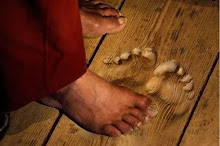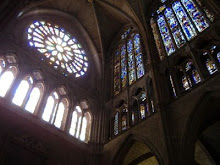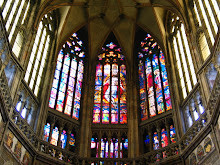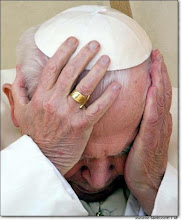 It helps, now and then, to step back and take the long view.
It helps, now and then, to step back and take the long view.31 December 2007
Step back... and take the long view...
 It helps, now and then, to step back and take the long view.
It helps, now and then, to step back and take the long view.28 December 2007
Christmas Night...
27 December 2007
26 December 2007
Holy Books...


By West Coast Perspective @ buffalorising.com
Dutch architects Merkx + Girod won the 2007 Lensvelt de Architect Interior Prize for their Boekhandel Selexyz Dominicanen in Maastricht – a chain bookstore inside an 800-year old former church. Architects were challenged to respect the original use and nature of the structure while creating enough commercial space for a viable business. (more...)
25 December 2007
24 December 2007
23 December 2007
On a Mission from God
22 December 2007
Searching for God
where and how to see you
where and how to find you.
You have made me and remade me,
and you have bestowed on me
all good things I possess
and still I do not know you.
I have not yet done that
for which I was made.
Teach me to seek you in desire.
Let me desire you by my seeking.
Let me find you by loving you,
Let me love you when I find you.
-St. Anselm
'Tis the season for gift giving...
What he actually said was...
Thou shall not be troubled
Thou shall not be tempted
Thou shall not be distressed
But He said: Thou shall not be overcome
-St. Julian of Norwich
From: "The Stand"
Was that true? If so, God help them.
-Stephen King
21 December 2007
Christian Leadership
Chicken little cannot be the patron saint of leaders because genuine Christian leaders believe that everything that imitates and shares in god's creative power is good, even when many are trying to convince us that we are really well-disguised mistakes or that the world is too big and bad to ever be changed. Ultimately, we will build the kingdom on earth and that kingdom will overcome the heart of darkness. As Michael Himes says, the real temptation is not to accept "the goodness of being finite and so the goodness of being human." Real Christian leadership embraces the reality of being finite and human and then accepts God's invitation to move beyond those limits to touch the kingdom of God."
-Fr. Gary J. Bagley
Which comes first?
The world works from the outside in.
The world would take people out of the slums.
Christ takes the slums out of people, and they take themselves out of slums.
The world would mold people by changing their enviornment.
Christ changes people, who then change their enviornment.
The world would shape human behavior,
but Christ can change human nature.
-Ezra Taft Benson
On Prayer...
Harsh.
The garment hanging in your closet is the garment of him who is naked.
The shoes that you do not wear are the shoes of one who is barefoot.
The money you keep locked away is the money of the poor.
The acts of charity you do not perform are so many acts of injustice you commit.
-St. Basil the Great
Love
Truth
Religion
Two Men, One Love

"A Pole and a German; a philosopher and a theologian; a great public personality and a shy scholar; a close collaboration and a deep spiritual friendship - one looks hard in the history of the Catholic Church to find a friendship so consequential for the faith and for the world as the partnership of Karol Wojtyla, Pope John Paul II, and Joseph Ratzinger, now Pope Benedict XVI. Both men sacrificed the lives they loved for an office and a service that did not seek. Both did so out of the greatness of their souls and the depth of their faith. Pope Benedict's tribute to his extraordinary predecessor is both a testimony and a pledge: a testimony to the depth of human brotherhood that friendship with Christ makes possible, and a pledge to continue extend, and deepen the witness of the Office of Peter." -George Weigel
The Value of Loneliness
All love lead to suffering. If we did not care for others in a deep and fundamental way, we would not experience grief when they are troubled or disturbed, when they face tragedy or misfortune, when they are ill and dying. Every person is ultimately confronted with the pain of separation or death, with tragic grief which can be healed in silence and isolation. When pain is accepted and felt as one's own, at the center of the being, then suffering grows into compassion for other human beings and all living creatures. Through pain, the heart opens and out of the sorrow come new sensitivities of levity and joy.
All suffering which is accepted and received with dignity eventuates in deepened sensitivity. One cannot be sensitive without knowing loneliness. To see is to be lonely -- to hear, a lonely one. Anyone who senses with a wide range of delicate feelings and meanings experiences loneliness. To be open to life in an authentic sense is to be lonely, for in such openness one hears and feels and senses beyond the ordinary. Through loneliness we are refined and sensitized and open to life's lofty ideals and influences. We are enabled to grow in awareness, in understanding, in aesthetic capabilities, in human relations.
-Anon
Doing the Truth in Love
This is, I suggest, the way we must hear those very strange saying of Jesus, the beatitudes. "Blessed are the poor, for the kingdom belongs to them. Blessed are the gentle, for they shall inherit the earth. Blessed are those who are in sorrow, for they shall find consolation. Blessed are those who hunger and thirst for justice, for they shall be filled. Blessed are the merciful, for they shall find mercy. Blessed are the single-hearted, for they shall see God. Blessed are those who are persecuted in the cause of justice, for the kingdom of heaven belongs to them" (Mt 5:3-10). What are we to make of the claims that Jesus seems to advance? What kind of statements are they? Surely they are not descriptions; has anyone noticed the gentle inheriting the earth or those who hunger and thirst being filled recently? Are they simply promises? Keep your fingers crossed and some happy day this will all come true. Surely not. I suggest that they might be heard as hypothesis to be demonstrated. Imagine the world this way, live accordingly, and see if they do not prove to be the case. The beatitudes are challenges to our imagination. They are to be concretized in our lives so that they are not ideal truths but idealized truths. They are not to be accepted or believed; they are to be done."
-Fr. Michael J. Himes
(Doing the Truth in Love, p. 142-143)
When it rains...
I believe that.
Sometimes it rains on the unjust.
I believe that too.
But I also believe that sometimes it just rains.
Neither God, nor justice, nor belief has anything to do with it.
-Anon.
Woodcarver
Love
Thirst
by: Mary Oliver
Another morning and I wake with thirst for the goodness I do not have.
I walk out to the pond and all the way God has given us such beautiful lessons.
Oh Lord, I was never a quick scholar but sulked and hunched over my books past the hour and bell;
grant me in your mercy a little more time.
Love for the earth and love for you are having such a long conversation in my heart.
Who knows what will finally happen or where I will be sent, yet already I have given a great many things away, expecting to be told to pack nothing except which, with this thirst, I am slowly learning.
A Dis-eased People

WWJB?
"The Christian life is more than finding Jesus--it is following Jesus. Following, it turns out, is not a one-time, spectacular act of faith, but a one-day-at-a-time, ordinary, unspectular following; a daily act of fearlessness that takes us through the most frightening and rugged terrain to a place of peace, joy, and abandon." -Mike Yaconelli
20 December 2007
An absurd love
-Gene Monterastelli
It's coming....

O Holy Night! The stars are brightly shining,
It is the night of our dear Saviour's birth.
Long lay the world in sin and error pining
‘Till He appeared and the soul felt its worth.
For yonder breaks a new and glorious morn.
O night divine, O night when Christ was born;
O night divine! O night, O night divine!
With glowing hearts by His cradle we stand.
O'er the world a star is sweetly gleaming,
Now come the wise men from Orient land.
In all our trials born to be our friend.
Behold your King! For His reign shall never end.
Behold your King! For His reign shall never end.
His law is love and His gospel is peace.
Chains he shall break, the slave is now our brother,
And in his name all oppression shall cease.
With all our hearts we praise His holy name.
Emmanuel, Prince of Peace, the Son of Man!
Emmanuel, Prince of Peace, and Son of Man!
19 December 2007
14 December 2007
13 December 2007
Am I not your health?
 "Hear me and understand well, my son the least, that nothing should frighten or grieve you. Let not your heart be disturbed. Do not fear that sickness, nor any other sickness or anguish. Am I not here, who is your Mother? Are you not under my protection? Am I not your health? Are you not happily within my fold? What else do you wish? Do not grieve nor be disturbed by anything." — Our Lady to Juan Diego
"Hear me and understand well, my son the least, that nothing should frighten or grieve you. Let not your heart be disturbed. Do not fear that sickness, nor any other sickness or anguish. Am I not here, who is your Mother? Are you not under my protection? Am I not your health? Are you not happily within my fold? What else do you wish? Do not grieve nor be disturbed by anything." — Our Lady to Juan Diego
11 December 2007
Advent works!
St. Ann's...

This story is the second in a bittersweet series documenting my recent one-day tour through the city's ravaged East Side. St. Ann's was actually the last stop on my tour. After having attended portions of at least six Sunday masses I headed over to St. Ann's at the advice of my father. He said that the interior is not to be missed. I had actually long thought that this church was already closed down. It is in an area of the city that had experienced major demographic shifts away from a predominantly Catholic population many generations ago (as opposed to some areas of the city which have only experienced this shift within the last generation). Its windows are covered with dense yellowed fiberglass sheets for protection, which makes them appear to be boarded up. For many years I had passed this magnificent edifice wondering if anything would ever be done with it, never realizing that it was still home to.... (more).
10 December 2007
Judge not, lest ye...

Love's Orphans
09 December 2007
07 December 2007
Christ the King
06 December 2007
Advent Prepares Us for the Sublime
A couple of years ago, Robert Waller published a book that became a runaway bestseller and an immensely popular movie. Entitled The Bridges of Madison County, it stirred the romantic imagination in a way that few other stories have in recent times, especially as it was played out in its film version by Clint Eastwood and Meryl Streep.
The story runs this way:
A photographer for National Geographic magazine is sent to photograph a series of old bridges in Madison County. Lost, he stops at a farmhouse to ask for directions. As chance would have it, the man of the house has just left for a cattle show. His wife is home alone and she and the photographer instantly sense a deep connection and fall violently in love.
Karma, soulmates, mysticism, whatever, they experience a rare and powerful affinity. Within hours they are in bed with each other, triggering a love affair that leaves them both sacramentally scarred for the rest of their lives.
The viewer of the movie or reader of this book is asked to believe something truly sublime has taken place, a masterpiece of love has been painted, and a noble thing worth more than life itself has just occurred. But can this be so? Can anyone paint a masterpiece in a couple of hours? Can sex with someone you met just two hours before be sublime?
To answer those questions, I suggest you watch another film which, ironically, was playing in theatres at nearly the same time. It's a version of Jane Austin's Sense and Sensibility and tells the story of a young woman who has to carry painful tension (one that includes the same feelings found in Bridges of Madison County) for a long time.
But unlike the characters in Bridges of Madison County, she doesn't quickly resolve it. Nobody is in bed with each other within a couple of hours. She carries the tension for a long time, years, and then finally when it is resolved there is true sublimity.
Why? Because something can only be sublime if first there has been some sublimation.
In essence, this expresses the meaning of Advent: For something to be sublime there must first be sublimation; fasting is the necessary prelude to feasting; greatness of soul is contingent on first nobly carrying tension; and what's truly divine can only appear after a certain kind of gestation.
Advent is about proper waiting.
It should therefore not be confused with Lent. The crimson-purple of Advent is not the black-purple of Lent. The former symbolizes yearning and longing, the latter repentance. The spirituality of Advent is not about repentance, but about carrying tension without prematurely resolving it so that what's born in us and in our world does not short-circuit love's rhythms.
What is the connection here? How does carrying tension help lead to the sublime? It does it by helping to produce the heat required for generativity.
An image might be helpful here. John of the Cross, in his book, The Living Flame of Love, compares our pre-Advent selves to green logs that have been thrown into a fire, the fire of love. Green logs, as we know, do not immediately burst into flame. Rather, being young and full of moisture, they sizzle for a long time before they reach kindling temperature and can take into themselves the fire that is around them so as to participate in it.
So too the rhythm of love: Only the really mature can truly burst into flame within community. The rest of us are still too self-contained, too green, too damp. We don't burst into flame when love surrounds us. Rather our dampness helps extinguish the communal flame.
What helps change this is precisely the tension in our lives. In carrying properly our unfulfilled desires we sizzle and slowly let go of the dampness of selfishness. In carrying tension we come to kindling temperature and are made ready for love.
Pierre Teilhard de Chardin, as a scientist, noticed that sometimes when you put two chemicals into a test-tube they do not automatically unite. They only merge at a higher temperature. They must first be heated to bring about unity.
There's an entire anthropology and psychology of love in that image. In order to love we must first be brought to a higher psychic temperature.
What brings us there? Sizzling in tension, not resolving things prematurely, not sleeping with the bride before the wedding, not trying to have the complete symphony within two hours.
The sublime has to be waited for. Only when there is first enough heat will there be unity. To give birth to what's divine requires the slow patience of gestation.
That's the algebra of Advent.
In Exile
Pierre Teilhard de Chardin once suggested that peace and justice will come to us when we reach a high enough psychic temperature so as to burn away the things that still hold us apart. In saying this, he was drawing upon a principle in chemistry: Sometimes two elements will simply lie side by side inside a test-tube and not unite until sufficient heat is applied so as to bring them to a high enough temperature where unity can take place.
That’s wonderful metaphor for advent.
What is advent?
Advent is about getting in touch with our longing. It’s about letting our yearnings raise our psychic temperatures so that we are pushed to eventually let down our guard, hope in new ways, and risk intimacy.
John of the Cross has a similar image: Intimacy with God and with each other will only take place, he says, when we reach a certain kindling temperature. For too much of our lives, he suggests, we lie around as damp, green logs inside the fire of love, waiting to come to flame but never bursting into flame because of our dampness.
Before we can burst into flame, we must first dry out and come to kindling temperature. We do that, as does a damp log inside a fire, by first sizzling for a long time in the flames so as to dry out. How do we sizzle psychologically and spiritually?
For John of the Cross, we do that through the pain of loneliness, restlessness, disquiet, anxiety, frustration, and unrequited desire. In the torment of incompleteness our psychic temperature rises so that eventually we come to kindling temperature and, there, we finally open ourselves to union in new ways. That too is an image for advent.
Advent is all about loneliness, but loneliness is a complex thing.
Nobel Prize winning author, Toni Morrison describes it this way:
"There is a loneliness that can be rocked. Arms crossed, knees drawn up, holding, holding on, this motion, unlike a ship’s, smoothes and contains the rocker. It’s an inside kind - wrapped tight like skin. Then there is a loneliness that roams. No rocking can hold it down. It is alive, on its own. A dry and spreading thing that makes the sound of one’s own feet going seems to come from a far-off place."
All of us know exactly what she is describing, especially the latter type, the roaming kind of loneliness that haunts the soul and makes us, all too often, too restless to sleep at night and too uncomfortable to be inside our own skins during the day.
And what’s the lesson in this? What we learn from loneliness is that we are more than any moment in our lives, more than any situation we are in, more than any humiliation we have experienced, more than any rejection we have endured, and more than all the limits within which we find ourselves. Loneliness and longing take us beyond ourselves. How?
Thomas Aquinas once taught that we can attain something in one of two ways: through possession or through desire. We like to possess what we love, but that isn’t often possible and it has an underside.
Possession is limited, desire is infinite. Possession sets up fences, desire takes down fences. To quote Karl Rahner, only in the torment of the insufficiency of everything attainable do we know that we are more than the limits of our bodies, our present relationships, our jobs, our achievements, and the concrete situations within which we live, work, and die.
Loneliness and longing let us touch, through desire, God’s ultimate design for us. In our longing, the mystics tell us, we intuit the kingdom of God. What that means is that in our desires we sense the deeper blueprint for things. And what is that?
Scripture tells us that the kingdom of God is not a matter of eating and drinking, of simple bodily pleasure, but a coming together in justice, peace, and joy in the Holy Spirit.
Ultimately, that is what we ache for in our loneliness and longing: consummation, oneness, intimacy, completeness, harmony, peace, and justice. Sometimes, of course, in our fantasies and daydreams that isn’t so evident. God’s kingdom seems something much loftier and more holy than what we often long for - sex, revenge, fame, power, glory, pleasure.
However even in these fantasies, be they ever so crass, there is present always a deeper desire, for justice, for peace, for joy, for oneness in Christ. Our loneliness and longing are a hunger and an energy that drive us, always, beyond the present moment. In them we do intuit the kingdom of God.
Advent is about longing, about getting in touch with it, about heightening it, about letting it raise our psychic temperatures, about sizzling as damp, green logs inside the fires of intimacy, about intuiting the kingdom of God by seeing, through desire, what the world might look like if a Messiah were to come and, with us, establish justice, peace, and unity on this earth.
Psalm
—Psalm 27:11-12
Advent
—Pope Benedict XVI (Joseph Cardinal Ratzinger), Seek That Which Is Above, 1986.
05 December 2007
04 December 2007
The Dream
in which all members know surely and simply
God's great love,
and each is certain that in the divine heart
we are all known by name.
In which Jesus is the very Word,
our window into the Father's heart;
the sign of God's hope and his design for all humankind.
In which the Spirit is not a party symbol,
but wind and fire in everyone;
gracing the church with a kaleidoscope of gifts
and constant renewal for all.
A church in which
worship is lively and fun as well as reverent and holy;
and we might be moved to dance and laugh;
to be solemn, cry or beat the breast.
A church in which
People know how to pray and enjoy it –
frequently and regularly, privately and corporately,
in silence and in word and song.
A church in which
The eucharist is the center of life
and servanthood the center of mission:
the servant Lord truly known in the breaking of the bread.
With service flowing from worship,
and everyone understanding
why a worship is called a service.
Let us dream of a church
in which the sacraments,
free from captivity by a professional elite,
are available in every congregation
regardless of size, culture, location or budget.
In which every congregation is free
to call forth from its midst priests and deacons,
sure in the knowledge that training and support services
are available to back them up.
In which the Word is sacrament too,
as dynamically present as bread and wine;
members, not dependent on professionals,
know what's what and who's who in the Bible,
and all sheep share in the shepherding.
In which discipline is a means,
not to self-justification,but to discipleship
and law is known to be a good servant but a very poor master.
A church
affirming life over death as much as life after death,
unafraid of change,
able to recognize God's hand in the revolutions,
affirming the beauty of diversity,
abhorring the imprisonment of uniformity,
as concerned about love in all relationships as it is about chastity,
and affirming the personal in all expressions of sexuality;
denying the separation between secular and sacred,
world and church,
since it is the world Christ came to and died for.
A church
without the answers,
but asking the right questions;
holding law and grace,
freedom and authority,
faith and works
together in tension,
by the Holy Spirit,
pointing to the glorious mystery who is God.
A church
So deeply rooted in gospel and tradition that,
like a living tree,
it can swing in the wind
and continually surprise us with new blossoms.
Let us dream of a church
with a radically renewed concept and practice of ministry
and a primitive understanding of the ordained offices.
Where there is no clerical status and no classes of Christians,
but all together know themselves to be part of the laos the holy people of God.
A ministering community
rather than a community gathered around a minister.
Where ordained people,
professional or not, employed or not,
are present for the sake of ordering and signing
the church's life and mission,
not as signs of authority or dependency,
nor of spiritual or intellectual superiority,
but with Pauline patterns of "ministry supporting church"
instead of the common pattern of "church supporting ministry."
Where bishops are signs and animators
of the church's unity, catholicity and apostolic mission.
Priests are signs and animators of her eucharistic life
and the sacramental presence of her Great High Priest.
And deacons are signs and animators
living reminders of the church's servanthood
as the body of Christ who came as, and is,
the servant slave of all God's beloved children.
Let us dream of a church
so salty and so yeasty
that it really would be missed if no longer around;
where there is wild sowing of seeds
and much rejoicing when they take root,
but little concern for success, comparative statistics,
growth or even survival.
A church so evangelical that its worship,
its quality of caring,
its eagerness to reach out to those in need cannot be contained.
A church
in which every congregation is in a process of becoming
free - autonomous, self-reliant, interdependent
none has special status:
the distinction between parish and mission gone.
But each congregation is in mission
and each Christian, gifted for ministry;
a crew on a freighter, not passengers on a luxury liner.
Peacemakers and healers abhorring violence in all forms
(maybe even football),
as concerned with societal healing
as with individual healing;
with justice as with freedom,
prophetically confronting the root causes of social,
political and economic ills.
A community:
an open, caring, sharing household of faith
where all find embrace, acceptance and affirmation.
A community:
under judgment, seeking to live with its own proclamation,
therefore,truly loving what the Lord commands
and desiring His promise.
And finally,
let us dream of a people called to recognize
all the absurdities in ourselves
and in one another,
including the absurdity that is LOVE,
serious about the call and the mission
but not, very much, about ourselves,
who, in the company of our Clown Redeemer
can dance and sing and laugh and cry in worship,
in ministry... and even in conflict.
- "The Dream," by Wesley Frensdorff
=============
Yes? No? Why? Why Not?



















































